 Libri di Kojin Karatani su Unilibro.it) Libri di Kojin Karatani su Unilibro.it)
|
|
2024 |
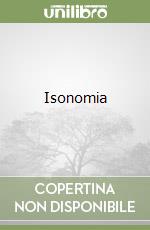 Title :
Isonomia
Title :
IsonomiaAuthor: Karatani Kojin Publisher: Timeo (Palermo) € 20,00
|
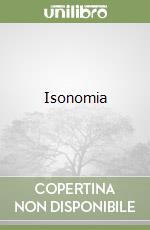 Title :
Isonomia
Title :
IsonomiaAuthor: Karatani Kojin Publisher: Timeo (Palermo) € 20,00
|
|
1917 |
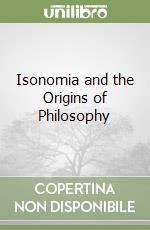 Title :
Isonomia and the Origins of Philosophy
Title :
Isonomia and the Origins of PhilosophyAuthor: Karatani Kojin, Murphy Joseph A. (TRN) Publisher: Duke Univ Pr € 22,40
|
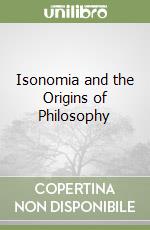 Title :
Isonomia and the Origins of Philosophy
Title :
Isonomia and the Origins of PhilosophyAuthor: Karatani Kojin, Murphy Joseph A. (TRN) Publisher: Duke Univ Pr € 80,40
|
|
1916 |
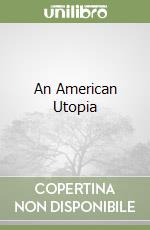 Title :
An American Utopia
Title :
An American UtopiaAuthor: Jameson Fredric, Dean Jodi, Giri Saroj, Hamza Agon, Karatani Kojin Publisher: Verso Books € 98,60
|
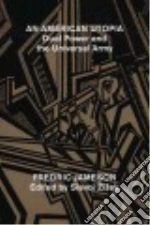 Title :
An American Utopia
Title :
An American UtopiaAuthor: Jameson Fredric, Dean Jodi, Zizek Slavoj, Hamza Agon, Karatani Kojin Publisher: Verso Books Controversial manifesto by acclaimed cultural theorist debated by leading writers Fredric Jameson’s path-breaking essay An American Utopia radically questions standard leftist notions of an emancipated society, advocating—among other things—universal conscription as the model for the communist reorganization of society, fully acknowledging envy and resentment as the central problem of a communist society, and rejecting the dreams of overcoming the division between work and leisure. Endorsing the axiom that to change the world one should begin by changing our dreams about how we imagine an emancipated society, Jameson’s text is ideally placed to trigger a debate on possible and imaginable alternatives to global capitalism. In addition to Jameson’s essay, the volume brings reactions to it by philosophers and political and cultural analysts, as well as an epilogue from Jameson. Many will be appalled at what they will encounter—there will be blood. But what if one has to spill such (ideological) blood to give the left a new chance? Contributors include Kim Stanley Robinson, Jodi Dean, Saroj Giri, Agon Hamza, Kojin Karatani, Frank Ruda, Alberto Toscano, Kathi Weeks, and Slavoj iek. € 20,30
|
|
1914 |
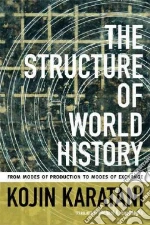 Title :
The Structure of World History
Title :
The Structure of World HistoryAuthor: Karatani Kojin, Bourdaghs Michael K. (TRN) Publisher: Duke Univ Pr In this major, paradigm-shifting work, Kojin Karatani systematically re-reads Marx's version of world history, shifting the focus of critique from modes of production to modes of exchange. Karatani seeks to understand both Capital-Nation-State, the interlocking system that is the dominant form of modern global society, and the possibilities for superseding it. In The Structure of World History, he traces different modes of exchange, including the pooling of resources that characterizes nomadic tribes, the gift exchange systems developed after the adoption of fixed-settlement agriculture, the exchange of obedience for protection that arises with the emergence of the state, the commodity exchanges that characterize capitalism, and, finally, a future mode of exchange based on the return of gift exchange, albeit modified for the contemporary moment. He argues that this final stage—marking the overcoming of capital, nation, and state—is best understood in light of Kant's writings on eternal peace. The Structure of World History is in many ways the capstone of Karatani's brilliant career, yet it also signals new directions in his thought. € 27,10
|
|
|
2005 |
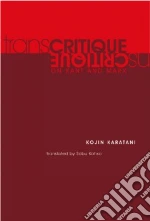 Title :
Transcritique
Title :
TranscritiqueAuthor: Karatani Kojin, Kohso Sabu (TRN) Publisher: Mit Pr Kojin Karatani's Transcritique introduces a startlingly new dimension to Immanuel Kant's transcendental critique by using Kant to read Karl Marx and Marx to read Kant. In a direct challenge to standard academic approaches to both thinkers, Karatani's transcritical readings discover the ethical roots of socialism in Kant's Critique of Pure Reason and a Kantian critique of money in Marx's Capital.Karatani reads Kant as a philosopher who sought to wrest metaphysics from the discredited realm of theoretical dogma in order to restore it to its proper place in the sphere of ethics and praxis. With this as his own critical model, he then presents a reading of Marx that attempts to liberate Marxism from longstanding Marxist and socialist presuppositions in order to locate a solid theoretical basis for a positive activism capable of gradually superseding the trinity of Capital-Nation-State. € 31,90
|
|
|
1995 |
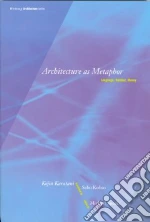 Title :
Architecture As Metaphor
Title :
Architecture As MetaphorAuthor: Karatani Kojin, Kohso Sabu (TRN), Speaks Michael (EDT) Publisher: Mit Pr Kojin Karatani, Japan's leading literary critic, is perhaps best known for hisimaginative readings of Shakespeare, Soseki, Marx, Wittgenstein, and most recently Kant. His works,of which Origins of Modern Japanese Literature is the only one previously translated into English,are the generic equivalent to what in America is called 'theory.' Karatani's writings are importantnot only for the insights they offer on the various topics under discussion, but also as an exampleof a distinctly non-Western critical intervention.In Architecture as Metaphor, Karatani detects arecurrent 'will to architecture' that he argues is the foundation of all Western thinking,traversing architecture, philosophy, literature, linguistics, city planning, anthropology, politicaleconomics, psychoanalysis, and mathematics. In the three parts of the book, he analyzes the complexbonds between construction and deconstruction, thereby pointing to an alternative model of 'secularcriticism,' but in the domain of philosophy rather than literary or cultural criticism.As Karataniclaims in his introduction, because the will to architecture is practically nonoexistent in Japan,he must first assume a dual role: one that affirms the architectonic (by scrutinizing the suppressedfunction of form) and one that pushes formalism to its collapse (by invoking Kurt Godel'sincompleteness theorem). His subsequent discussions trace a path through the work of ChristopherAlexander, Jane Jacobs, Gilles Deleuze, and others. Finally, amidst the drive that motivates allformalization, he confronts an unbridgeable gap, an uncontrollable event encountered in the exchangewith the other; thus his speculation turns toward global capital movement. While in the presentvolume he mainly analyzes familiar Western texts, it is precisely for this reason that his voicediscloses a distance that will add a new dimension to our English-language discourse. € 31,20
|
|
|
1993 |
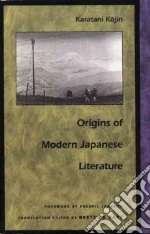 Title :
Origins of Modern Japanese Literature
Title :
Origins of Modern Japanese LiteratureAuthor: Kojin Karatani, De Bary Brett (TRN), Fish Stanley Eugene (EDT), Jameson Fredric (EDT) Publisher: Duke Univ Pr Since its publication in Japan ten years ago, the Origins of Modern Japanese Literature has become a landmark book, playing a pivotal role in defining discussions of modernity in that country. Against a history of relative inattention on the part of Western translators to modern Asian critical theory, this first English publication is sure to have a profound effect on current cultural criticism in the West. It is both the boldest critique of modern Japanese literary history to appear in the post-war era and a major theoretical intervention, which calls into question the idea of modernity that informs Western consciousness. In a sweeping reinterpretation of nineteenth-and twentieth-century Japanese literature, Karatani Kojin forces a reconsideration of the very assumptions underlying our concepts of modernity. In his analysis, such familiar terms as origin, modern, literature, and the state reveal themselves to be ideological constructs. Karatani weaves many separate strands into an argument that exposes what has been hidden in both Japanese and Western accounts of the development of modern culture. Among these strands are: the "discovery" of landscape in painting and literature and its relation to the inwardness of individual consciousness; the similar "discovery" in Japanese drama of the naked face as another kind of landscape produced by interiority; the challenge to the dominance of Chinese characters in writing; the emergence of confessional literature as an outgrowth of the repression of sexuality and the body; the conversion of the samurai class to Christianity; the mythologizing of tuberculosis, cancer, and illness in general as a producer of meaning; and the "discovery" of "the child" as an independent category of human being. A work that will be important beyond the confines of literary studies, Karatani's analysis challenges basic Western presumptions of theoretical centrality and originality and disturbs the binary opposition of the "West" to its so-called "other." Origins of Modern Japanese Literature should be read by all those with an interest in the development of cultural concepts and in the interrelating factors that have determined modernity. € 23,70
|